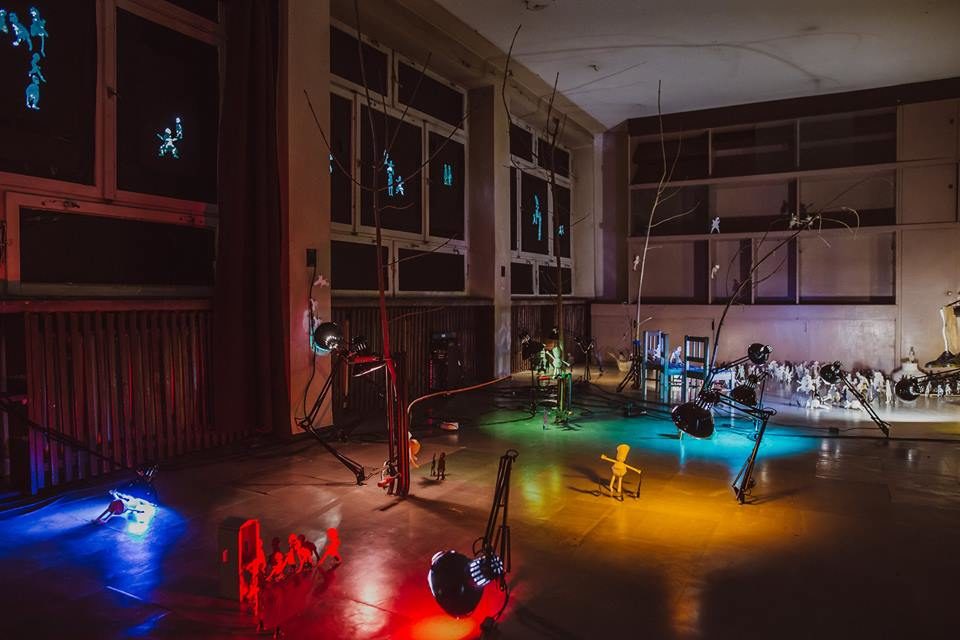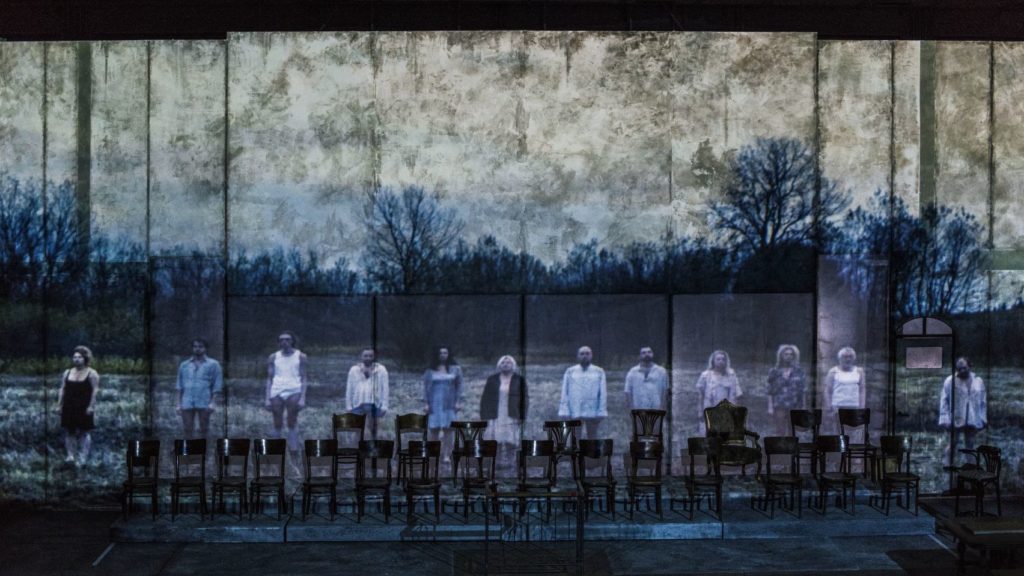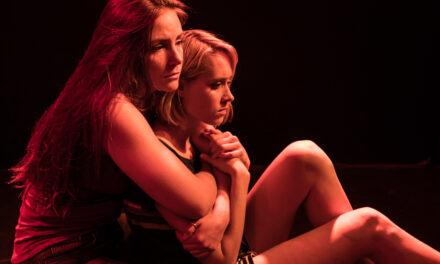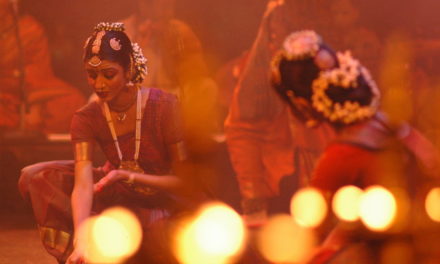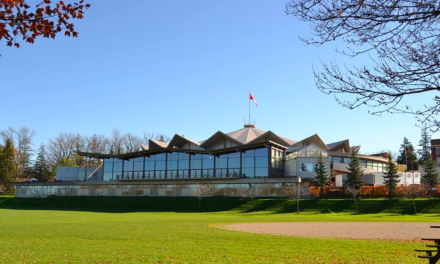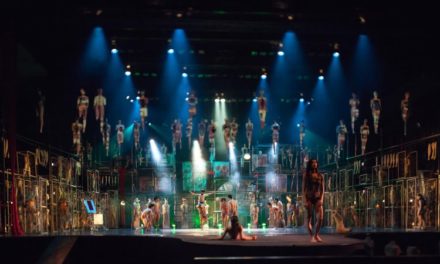In December 2017, the Divine Comedy International Theatre Festival (Międzynarodowy Festiwal Teatralny Boska Komedia) celebrated its 10th anniversary in a characteristically festive and wintry Kraków. The two-week program continues to showcase cutting-edge Polish premieres, curated from theatres around the country by Artistic Director Bartosz Szydłowski.
Over its first decade, the festival has grown in scale and scope—its much-anticipated events now extend to venues around the city and include select productions by international artists. Today, as both a presenting and a producing organization, the Divine Comedy serves as an anchor of Polish work in contemporary theatre worldwide. The Divine Comedy now operates across three playfully named platforms: “Inferno,” “Purgatorio,” and “Paradiso.”
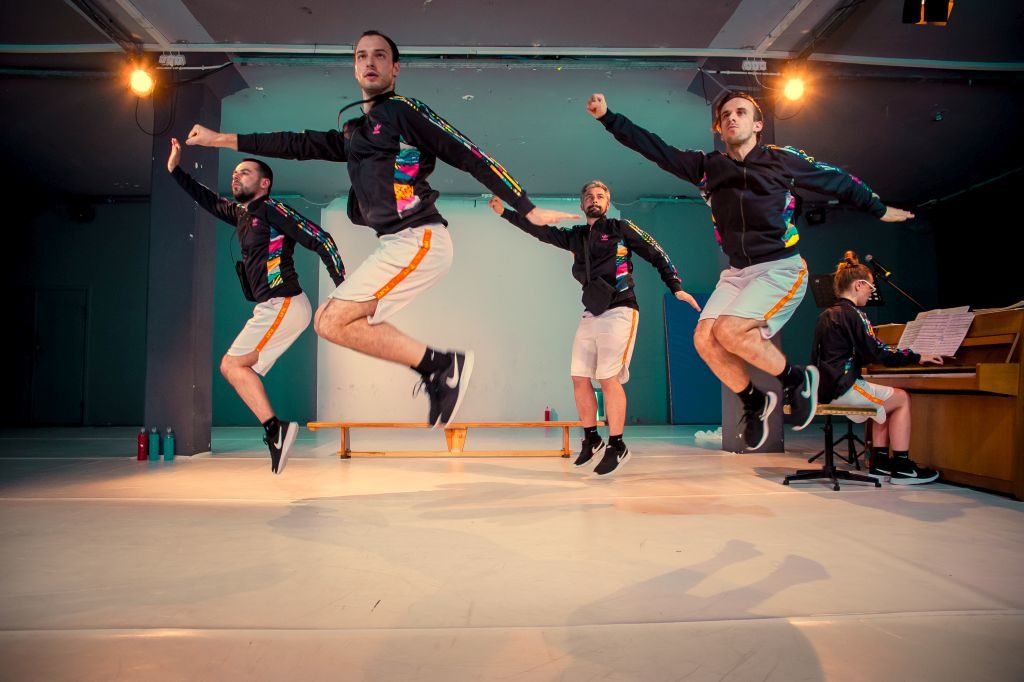
Cezary Goes To War (Cezary idzie na wojnę), dir. Cezary Tomaszewski, Komuna/Warszawa, Warsaw (2017). Photo credit: PAT MIC
The “Inferno” section not only presents, but evaluates a program of new Polish productions. The Divine Comedy concludes with an awards ceremony to honor the best work by actors, designers, directors, and more as presented here. The artists recognized receive monetary prizes, awarded by the festival and partners that include the President of the City of Kraków and the Polish Ministry of Culture and National Heritage. “Inferno” is judged by an invited panel of international artistic leaders, and as such, it also serves as a point of global contact for the latest in Polish theatre.
The Divine Comedy’s “Purgatorio” offers still more productions, created by artists from Poland and countries around the world. These can include the festival’s own co-productions with other arts institutions, theatres, and partners. A selection of related events accompanies these shows—from discussions and lectures to exhibitions and installations. Here, the festival invites audiences to engage more deeply with its programming, the artists behind it, and the cultures and theatres they come from, as well as the larger festival audience and the art form of theatre more generally.
Through its “Paradiso” program, the Divine Comedy spotlights thesis productions by artists who are set to graduate from the Polish professional theatre training schools, which feed into the country’s theatres. As such, it offers insight into new voices and perspectives that will soon emerge on Polish stages—and allows these artists to encounter a wider audience.
The Divine Comedy defines itself on its website as “a space of theatrical alliance, where aesthetic friction and artistic confrontation never come into play without respect and a mutual desire to know one another.” The festival’s socially engaged and international elements point to Artistic Director Szydłowski’s longtime impulses. Since 2011, he has also served as curator at Kraków’s historic Teatr Słowackiego. The next year, he and that theatre’s artistic director, Krzysztof Głuchowski, launched the Małopolski Ogród Sztuki, a second space devoted to experimental work and centered around young artists.
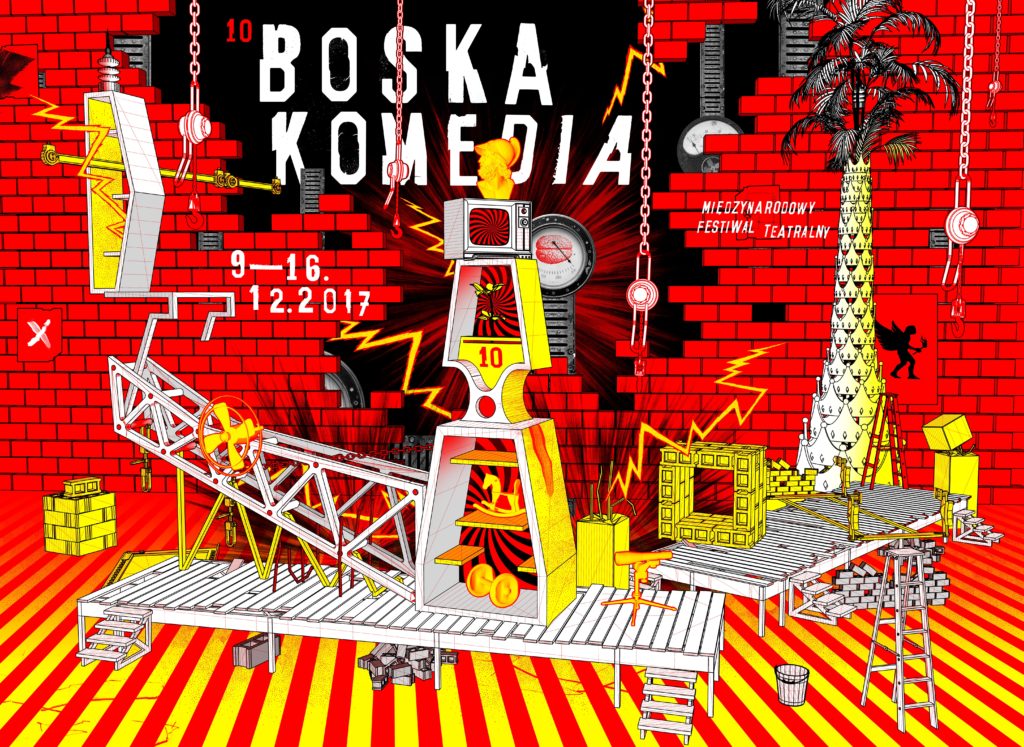
The Divine Comedy International Theatre Festival (Międzynarodowy Festiwal Teatralny Boska Komedia), Kraków (2017).
In addition, Szydłowski continues to lead Kraków’s Teatr Łaźnia Nowa, together with Małgorzata Szydłowska and Ewa Wolniewicz. Szydlowski has been associated with this theatre since the activities of his Łaźnia Foundation, which reach back more than 20 years. Łaźnia Nowa as it stands today—housed in a former technical school in the neighborhood of Nowa Huta, a former Socialist factory district—was founded in 2005. From the start, the institution has functioned as part of Trans Europe Halles, a network of European arts organizations that operate in post-industrial spaces.
While Teatr Łaźnia Nowa offers its own season of theatre—along with community events, concerts, film screenings, and more—it also collaborates with the Kraków Festival Bureau to produce the Divine Comedy each December.
With its stated 2017 theme of “Theatre in Ruins” (“Teatr w Ruinie”), the festival embraced political inquiry, expression, and dialogue, on stage and off. Szydłowski explained in a festival talk that the phrase was a riff on “Poland is in ruins”—a familiar campaign slogan of the Polish Law and Justice Party, which came to power in November 2015.
The country has since seen changes in its public institutions, including state-supported theatres. A broader debate on Poland’s cultural and national identity has also emerged in response to such national, as well as greater political shifts. Poland joined the European Union in 2004, only three years before the Divine Comedy was founded.
In this year’s “Inferno” program, a number of productions—from classic Polish texts, such as Jan Klata’s production of Stanisław Wyspiański’s The Wedding (Wesele), to more experimental new performance, like Teatr Łaźnia Nowa’s Fuck…Scenes Of The Revolt (Fuck…Sceny buntu)—often evoked, and even directly engaged the festival’s thematic context and questions.
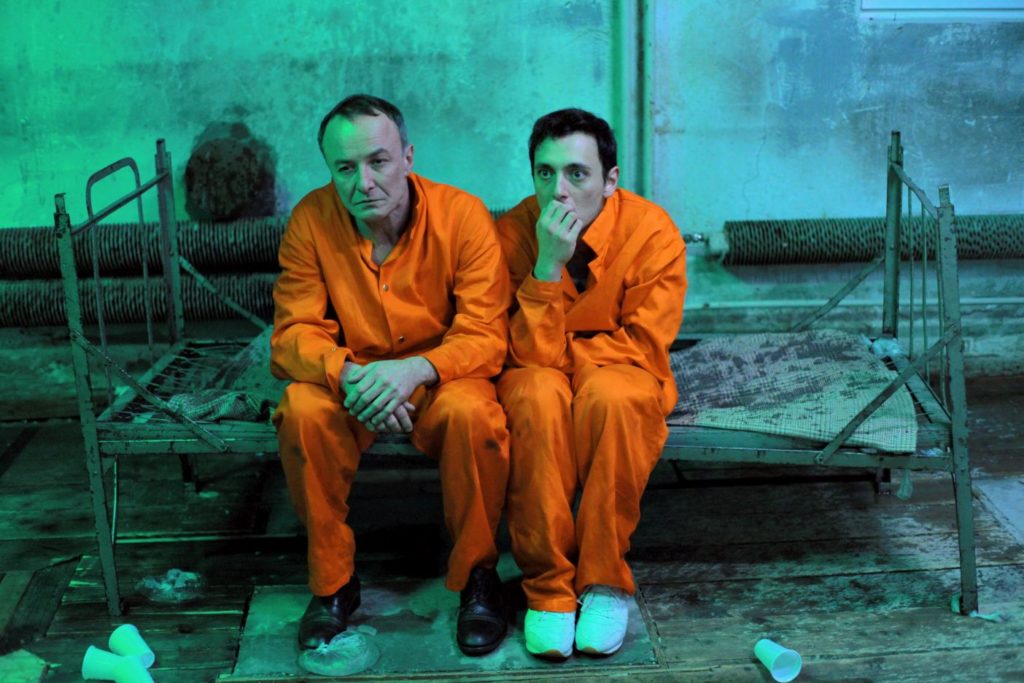
The Secret Life Of The Friedmans (Sekretne życie Friedmanów), dir. Marcin Wierzchowski, Teatr Ludowy, Kraków (2017). Photo credit: Przemysław Sieraczyński
One important example was Hymn To Love (Hymn do miłości). Conceived, directed, and with a libretto by Marta Górnicka, as well as dramaturgy by Agata Adamiecka, the music- and movement-based piece was a premiere of Teatr Polski in Wrocław. The show’s cohesive chorus, made up of individuals with a range of identities and appearances, sang and spoke texts from the cultural canon—a simple, poetic challenge to currents of nationalism, near and far. The production took both of the 2017 “Inferno” prizes for design, including choreography and music, as well as set design and costumes.
Also significant in the jury’s decision was to award Teatr Ludowy’s The Secret Life Of The Friedmans (Sekretne życie Friedmanów)—staged environmentally, around the theatre’s Nowa Huta space—four of the nine “Inferno” awards. These included the coveted “Best Production” prize. Ludowy’s artistic director, Małgorzata Bogajewska, had recently completed her first year in the role.
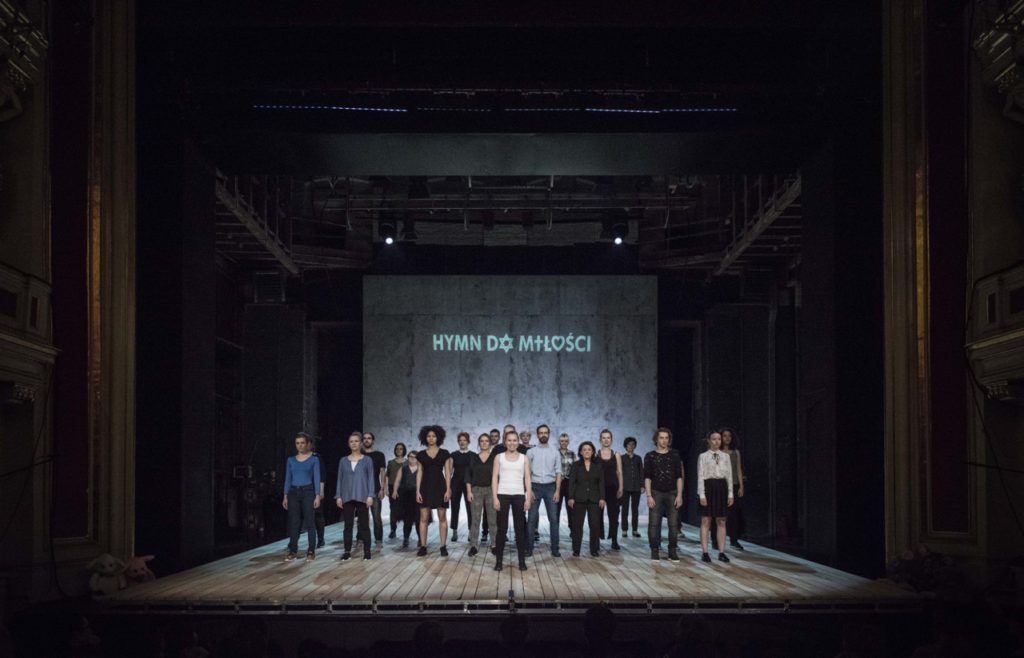
Hymn To Love (Hymn do Miłości); dir. and libretto by Marta Górnicka, Teatr Polski, Poznań (2017). Photo credit: Magda Hueckel
At the 2017 Divine Comedy, the following “Inferno” program artists were honored, by a panel that included Reem Allam, Cesar Augusto, Jurriaan Cooiman, Matthias Pees, Diane Rodriguez, and Ji-Young Won:
- Best Production: The Secret Life Of The Friedmans (Sekretne życie Friedmanów, Teatr Ludowy, Kraków, directed by Marcin Wierzchowski, adapted by Marcin Wierzchowski and Daniel Sołtysiński from the documentary film by Andrew Jarecki)
- Best Direction: Agata Duda-Gracz for You’ll Be Pleased, Madam, Or The Very Last Wedding In Kamyk Village (Będzie Pani zadowolona, czyli rzecz o ostatnim weselu we wsi Kamyk, Teatr Nowy–Poznań, with text also by Agata Duda-Gracz)
- Best Ensemble: Cezary Goes To War (Cezary idzie na wojnę, Komuna/Warszawa, Warsaw, directed by Cezary Tomaszewski)
- Best Actress: Edyta Łukaszewska in You’ll Be Pleased, Madam, Or The Very Last Wedding In Kamyk Village
- Best Actor: Piotr Pilitowski as the Father in The Secret Life Of The Friedmans
- Best Music and Choreography: Teoniki Rożynek and Anna Godowska for Hymn To Love (Hymn do Miłości, Teatr Polski–Poznań, directed by Marta Górnicka)
- Best Set Design and Costumes: Robert Rumas and Anna Maria Karczmarska for Hymn To Love
- Best Supporting Actor: Andrzej Kłak in various roles in Fuck…Scenes Of The Revolt (Fuck…Sceny Buntu, Teatr Łaźnia Nowa, directed by Marcin Liber, with text and dramaturgy by Krzysztof Szekalski)
- Best Supporting Actress: Małgorzata Kochan as the Mother in The Secret Life Of The Friedmans
This year’s “Purgatorio” featured 11 shows. These included the latest opus of Krystian Lupa, The Trial (Proces), based on the Franz Kafka novel and produced by Warsaw’s Nowy Teatr in cooperation with several partners. Teatr Słowackiego’s Vernon Subutex—an adaptation of the French novel by Virginie Despentes, directed by Wiktor Rubin and with dramaturgy by Jolanta Janiczak—received its first public performances in this program of the festival.
The Divine Comedy also presented its first “Little Divine Comedy,” a series of shows for younger audiences, in December. Here, Heaven Hell (Piekło Niebło), by the Czech artist Jakub Krofta, explored the loss of a parent, and Anna Wieczur-Bluszcz’s Kasieńka delved into immigration. The Brazilian artist Duda Paiva’s Tales From Oblivion (Opowieści z Niepamięci), created with Teatr Animacji from Poznań, offered an interactive world of ancient Slavic myth.
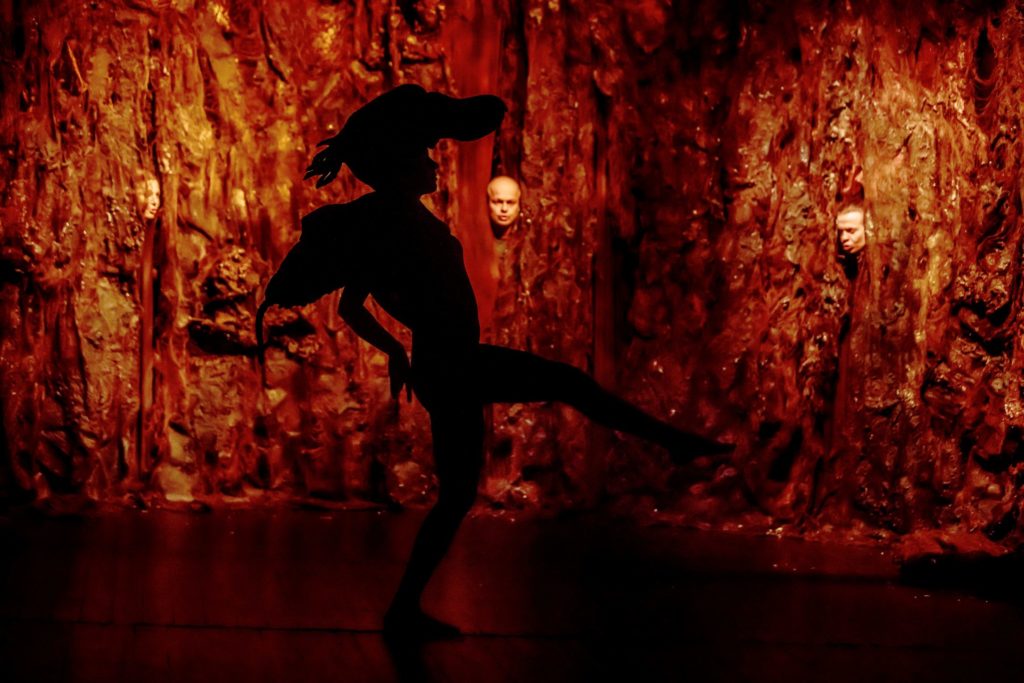
Tales From Oblivion (Opowieści z Niepamięci), dir. Duda Paiva, Teatr Animacji, Poznań (2016). Photo credit: Krzysztof Bieliński
“Paradiso,” in turn, was devoted this year to actor-driven diploma pieces out the Wyspiański National Academy of Theatre Arts of Kraków, as well as its Puppetry Department, situated in Wrocław. The use of music to explore the roots of culture marked performances such as To The Depths (Do Dna), directed and with a script by Ewa Kaim, and The Czech Diploma Show (Český díplom), directed by Piotr Ratajczak, an adaptation by Piotr Rowicki of Mariusz Szczygieł’s reportage.
As its provocative theme likely intended, the 2017 Divine Comedy festival proved that Polish theatre is, in fact, vibrant—just as the art form, never free from challenges, continues to find creativity in constraints, along with unexpected ways to thrive in new contexts.
For its next 10 years, the Divine Comedy can count on the devoted audiences it has built over its first. From the basis of its unique structure, and out of the legacy of the Polish work it has supported and shared thus far, the festival only stands to deliver theatre with ever more expression, innovation, and urgency.
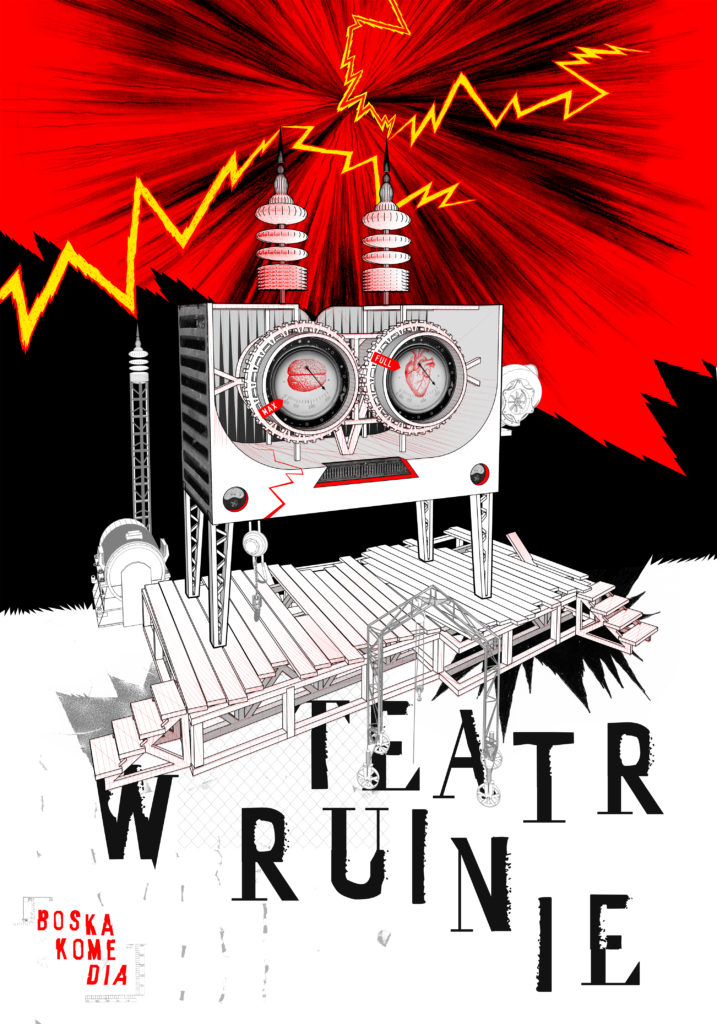
The Divine Comedy International Theatre Festival (Międzynarodowy Festiwal Teatralny Boska Komedia), Kraków (2017).
A special report on Divine Comedy Festival was prepared with support of the Adam Mickiewicz Institute – the national institution of the culture of Poland. To learn more about polish theatre go to http://culture.pl/en/category/performance
This post was written by the author in their personal capacity.The opinions expressed in this article are the author’s own and do not reflect the view of The Theatre Times, their staff or collaborators.
This post was written by Lauren Dubowski.
The views expressed here belong to the author and do not necessarily reflect our views and opinions.

